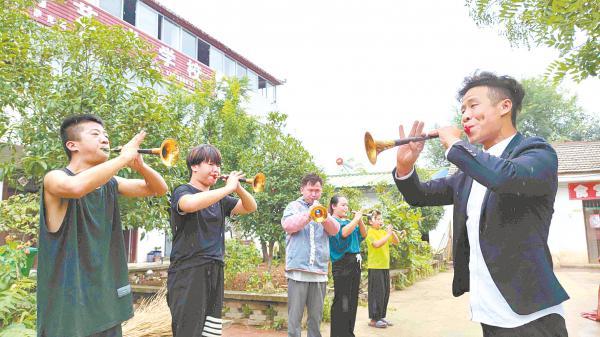Qin Xiangkui: Let the Traditional Suona Art Be Inherited
Recently, the reporter came to the foot of Maogong Mountain in Humiao Township, Yicheng District, near Qinglong Bay Picking Garden.
"These children all live here. Some parents work outside, while others live far away. Playing suona is not only a way of inheriting the unique culture of their hometown, but also a skill to earn a living. It can also exercise their bodies. As long as children want to learn, I will teach." Qin Xiangkui, a suona teacher, said.
Qin Xiangkui, 29, was born in a suona family in Xiangying Village, Lizhai Town, Xiangcheng, Zhoukou. He was influenced by his father to learn suona since childhood. "In those days, playing the suona was not something to be proud of, and it was even looked down upon." Qin Xiangkui recalled that in order to support the family, his father and grandfather would play a part of it when there was a wedding or funeral in the village. "When you're lucky, you get a few bucks when you meet someone. Most of the time, you eat the cold rice left over from other people's banquets, and you have a hard life."
Born into a suona family, Qin Xiangkui showed his talent in playing suona since he was a child. "When I was a child, my father played suona, and I listened to it. I could hum the tune. I started learning suona when I was 6 years old. My elders wanted me to pass on this skill to make a living. I have been playing for more than 20 years." Qin Xiangkui said that with his dedication and love for suona, he went to study all over the country when he grew up. Under the guidance of famous teachers, he began to work as a suona teacher in Xiangcheng, Zhoukou when he was 17 years old. In 2019, he founded a suona school.

Qin Xiangkui (first from right) teaches students how to play suona.
Qin Xiangkui carried forward the techniques handed down from his ancestors and served the villagers with his skillful suona blowing skills. Suona also became his main tool for making a living. He is often invited to participate in various performances and activities, and every time his wonderful suona performances can attract many people's attention.
"People often come to me to perform, and students come to me to study. I really enjoy the feeling of playing suona on the stage, and I am very happy that it can bring happiness to the audience." Qin Xiangkui said that his students come from all over the world, and there are old There are few.
Qin Xiangkui's suona has changed from accompaniment at weddings and weddings in the countryside to playing on the stage; from a simple craft of making a living to a way to express emotions and sing praises for a better life. Suona not only delights himself, but also delights the audience and enriches the cultural life of the masses.
"My family's suona skills have been passed down for several generations - my grandfather taught suona to my father, and my father taught me. When my son is older, I will also teach him the suona skills, let the traditional suona Art is passed on." Qin Xiangkui said.
 渝公网安备 50010702504639号
渝公网安备 50010702504639号